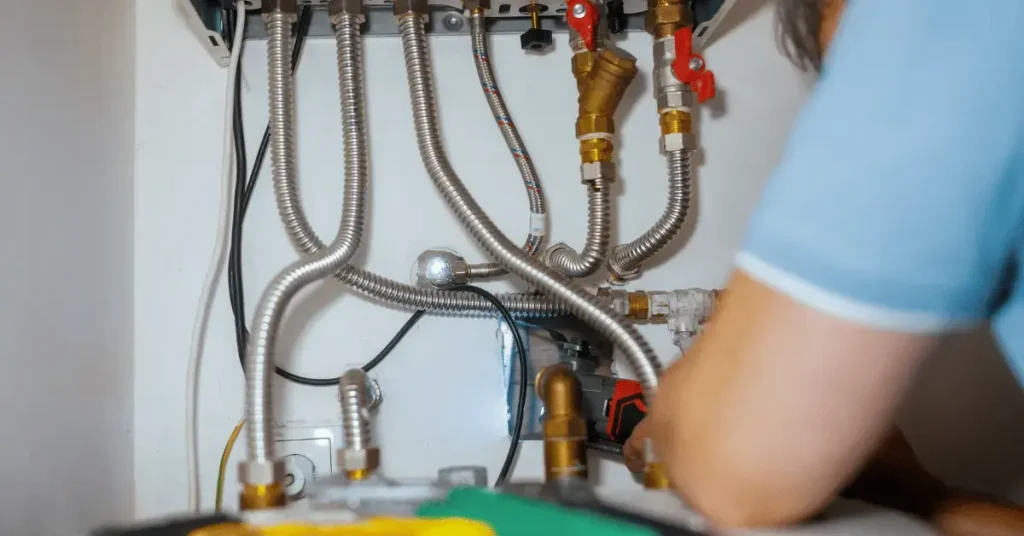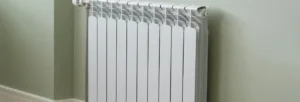Quick Answer: If your water heater smells like gas, shut off the gas supply immediately, avoid turning on lights or electronics, evacuate everyone, and call your gas company or local fire department. A gas odor, especially a rotten-egg smell caused by mercaptan, signals a leak or combustion problem that can quickly turn dangerous if ignored. Midwest homeowners, especially those in Independence, MO, should never attempt DIY repairs without help from a professional.
Understanding Why Your Water Heater Smells Like Gas
A water heater that smells like gas is a clear warning sign of a natural gas leak or incomplete combustion inside the burner assembly. The odor is added deliberately by utilities using mercaptan, a harmless chemical that mimics rotten eggs to help detect leaks early. In some cases, these combustion issues can also affect performance, leaving homeowners running out of hot water fast due to inefficient heating.
Common causes include:
A loose gas control valve connection
Cracked or corroded supply lines
Faulty thermocouple or flame sensor
Improper venting system or flue pipe leaks
Accumulated hydrogen sulfide gas in well water (often mistaken for natural gas)
In Independence and surrounding Midwest regions, cold snaps, ground shifting, and aging infrastructure increase leak risks, especially in older homes.
Step-by-Step: What to Do the Moment You Smell Gas
Do not ignite or switch on anything.
Even a spark from a light switch or phone can trigger an explosion.Turn off the gas supply.
Locate the shut-off valve near the heater and turn it perpendicular to the pipe.Evacuate immediately.
Get everyone, including pets, outside tothe fresh air.Call 911 or your gas utility.
Report a possible natural gas leak and wait for clearance.Contact a local licensed plumber once the scene is safe for inspection and repair.
Quick Tip: Never attempt to relight the pilot light until a professional confirms it’s safe. If you do, use a long lighter and follow the manufacturer’s printed instructions exactly.
Immediate Safety Actions and Their Importance
| Action | Purpose | Safety Rating |
|---|---|---|
| Shut off gas valve | Stops gas flow to prevent buildup | ⭐⭐⭐⭐⭐ |
| Evacuate the building | Reduces risk of inhalation/explosion | ⭐⭐⭐⭐⭐ |
| Avoid electrical switches | Prevents spark ignition | ⭐⭐⭐⭐ |
| Call emergency services | Professional containment | ⭐⭐⭐⭐⭐ |
| Ventilate area (if safe) | Helps disperse gas after clearance | ⭐⭐⭐ |
Common Reasons for a Gas Smell Around Your Water Heater
While every home is different, these are the most frequent causes Midwest plumbers find during inspections:
1. Loose or Damaged Gas Connections
Over time, vibration and thermal expansion can loosen fittings between your gas shut-off valve, control manifold, and pilot assembly.
2. Faulty Thermocouple or Flame Sensor
These safety devices detect whether the pilot light is lit. A faulty sensor may keep releasing gas even when there’s no flame, causing accumulation.
3. Blocked or Misaligned Flue Pipe
If exhaust gases can’t escape through the vent, you might smell combustion byproducts (carbon monoxide and unburnt gas) near your heater.
4. Corroded Burner Assembly
Rust or sediment buildup in the combustion chamber can restrict airflow, leading to incomplete combustion.
5. Hydrogen Sulfide Odor in Water Supply
If your hot water heater smells like gas only when the water runs, the culprit may be sulfur bacteria reacting with the anode rod.
Quick Fix: Have aplumber inspect for bacterial contamination and consider replacing the magnesium anode rod with an aluminum-zinc one.
When Your Gas Water Heater Smells Like Gas but No Leak Is Found
Sometimes, homeowners report that their water heater smells like gas but no leak is detected. This can be caused by:
Temporary release during pilot ignition
Vent backdraft in tightly sealed homes
Residual mercaptan from a previous leak
Odor absorbed in insulation or drywall
How to Neutralize Lingering Odors:
Ventilate the room for 24 hours.
Run a gas detector test to confirm zero ppm.
Wipe nearby surfaces with diluted vinegar solution.
The Science Behind the Rotten Egg Smell
Natural gas itself is odorless. The distinctive smell comes from ethyl mercaptan, added so humans can detect leaks at concentrations as low as 1 part per million. If your faint gas smell near water heater persists, treat it seriously, it may indicate a micro-leak that only a professional gas leak detection tool can find.
Midwest plumbers often use Kohlman pressure gauges or combustible gas sniffers to pinpoint micro-leaks invisible to the naked eye.
Comparing Gas Odor Causes and Solutions
| Possible Cause | Warning Sign | Recommended Action |
|---|---|---|
| Loose fittings | Hissing noise | Shut valve + call plumber |
| Thermocouple fault | Pilot won’t stay lit | Replace sensor |
| Flue blockage | Soot or exhaust smell | Clean or replace flue |
| Bacteria in tank | Odor only in hot water | Flush and disinfect tank |
| New installation | Temporary odor | Ventilate for 24 hours |
Why Midwest Homes Are at Higher Risk
In states like Missouri, Kansas, and Iowa, frequent temperature fluctuations expand and contract gas supply lines, weakening seals. Basement humidity and sediment-heavy municipal water also speed up corrosion in gas valves and anode rods.
That’s why homeowners in Independence, MO often benefit from annual gas line pressure testing and water heater inspections performed by local heating specialists familiar with regional weather patterns.
DIY Leak Checks You Can Safely Try (After Evacuation Clearance)
Once professionals clear your home of any danger:
Mix dish soap and water in a spray bottle.
Spray connections and watch for bubbles, they indicate a leak.
Test fittings along the gas control valve, supply line, and pilot tubing.
Avoid matches or flames.
If bubbles appear, do not tighten, call a professional plumber immediately.
Tip: Keep a combustible gas alarm installed near your water heater. They cost around $40–$60 and can detect both propane and natural gas leaks early.
Preventing Future Gas Odors: Long-Term Tips
To avoid future incidents where your gas smell from water heater returns, follow these professional maintenance tips:
Schedule annual inspections.
Ensure burners, sensors, and valves are tested annually.Flush your tank every 6–12 months to prevent sediment buildup.
Check venting systems.
Make sure exhaust flues are properly sealed and unobstructed.Install a carbon monoxide detector in your basement or utility room.
Upgrade to modern equipment.
If your water heater exhaust smells like gas, you may need a sealed-combustion or Tankless Water Heater for improved safety.
Professional Preventive Measures
Replace aging gas control valves every 7–10 years.
Test thermocouples annually for proper voltage response.
Inspect drip legs for debris and corrosion.
Perform an air pressure test after any gas line work.
Install gas detectors in both garage and basement.
What to Do If the Smell Returns After Replacement
If you notice a gas smell after water heater replacement, it could stem from:
Improper pipe sealing with Teflon tape instead of gas-rated compound
Incorrect vent slope or obstruction
Residual air pockets in the gas line
Loose manifold connection
Have your installer return for a pressure test and confirm proper installation torque and alignment.
Is the Gas Smell Toxic?
Yes. Inhaling natural gas or hydrogen sulfide can cause:
Headaches
Nausea
Dizziness
Fatigue
In severe cases, exposure may lead to unconsciousness or suffocation. Install CO detectors and schedule maintenance with cooling system experts who understand how HVAC systems interact with shared combustion zones in basements.
Considering an Upgrade?
If repeated repairs aren’t solving your issue, it might be time to compare Choosing between Tank vs Tankless water heater options. Modern tankless systems eliminate standing pilot lights and are sealed, reducing leak risk. Pairing them with the right thermostat for steam heating system ensures overall energy efficiency across your home.
Extra Tip: Avoid DIY Gas Line Work
Even if you’re handy, working with gas lines without certification is unsafe and often illegal. Always hire a plumber for leak detection, replacement, or installation. They’ll also check for Pros and cons of ductless heating systems if your home uses shared gas venting between units.
Call the Experts When Safety Comes First
If your water heater smells like gas, even faintly, it’s not worth the risk. The cost of immediate inspection is minimal compared to potential explosion or CO poisoning. Midwest homeowners—especially those in Independence, MO, trust Duty Calls Plumbing and Rooter LLC for honest, emergency-safe service.
📞 Call (816) 945-2131, available 24/7 across Independence and surrounding Midwest areas.
Frequently Asked Questions About Water Heater Smelss Like Gas
Can electric water heaters smell like gas?
Yes, but rarely. The odor may come from burning dust on heating elements or nearby gas appliances, not from the unit itself.
What should I do if my new water heater smells like gas?
Ventilate the area and call your installer. Minor odors can occur during first ignition but should clear within a day.
Is it normal to smell gas from the water heater after maintenance?
A faint odor lasting a few minutes can be normal due to line purging. Persistent smells require immediate inspection.
Can gas leaks occur in tankless water heaters?
Yes. Although safer, tankless units still use gas valves and manifolds that must be sealed properly.
How often should a gas water heater be serviced?
At least once per year. Annual service includes leak testing, burner cleaning, and gas pressure verification.








